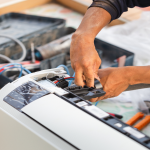Alcohol addiction is a complex challenge that affects people from all walks of life, but for LGBTQ+ individuals, the road to recovery can be even more difficult. Many in the LGBTQ+ community face unique barriers such as discrimination, societal rejection, and internalized shame that can exacerbate alcohol use disorders. However, LGBTQ alcohol addiction counseling and LGBTQ alcohol rehab programs offer critical support to help individuals in the community navigate their recovery journey.
In this blog post, we will explore the importance of tailored treatment options for LGBTQ+ individuals, the role of LGBTQ+ alcohol rehab centers, and how seeking LGBTQ alcohol treatment centers in Los Angeles can provide individuals with the compassionate, specialized care they need to overcome alcohol addiction.
Why LGBTQ+ Individuals Are at Greater Risk for Alcohol Addiction
The LGBTQ+ community often faces higher rates of substance abuse compared to the general population. Several factors contribute to this heightened risk:
1. Discrimination and Rejection
LGBTQ+ individuals often experience discrimination, whether from family members, peers, or the broader society. These negative experiences can result in feelings of isolation, rejection, and low self-esteem, leading some individuals to turn to alcohol or other substances as a form of self-medication.
2. Internalized Homophobia or Transphobia
Internalized homophobia or transphobia refers to the negative beliefs and feelings LGBTQ+ individuals may harbor about their own identity due to societal stigma. This can lead to emotional distress, which, combined with the pressures of living in an often unaccepting environment, can contribute to alcohol misuse.
3. Mental Health Struggles
LGBTQ+ individuals are also at higher risk for mental health disorders such as anxiety, depression, and post-traumatic stress disorder (PTSD), often linked to past trauma or rejection. Mental health issues and alcohol use are closely intertwined, with many individuals using alcohol to numb emotional pain or cope with difficult feelings.
As these challenges accumulate, many LGBTQ+ individuals turn to alcohol as a way to cope, which can lead to alcohol addiction over time. Therefore, LGBTQ alcohol addiction counseling plays a pivotal role in supporting recovery by addressing both the emotional and physical aspects of alcohol use.
The Role of LGBTQ+ Alcohol Addiction Counseling
LGBTQ alcohol addiction counseling offers a vital, affirming space where individuals can explore their relationship with alcohol and gain the tools they need to break free from addiction.
1. Affirmative Therapy for LGBTQ+ Individuals
One of the core components of LGBTQ alcohol addiction counseling is affirmative therapy. This therapeutic approach recognizes and validates an individual’s LGBTQ+ identity and works to reduce feelings of shame or guilt related to their substance use. Affirmative therapy not only helps individuals understand how alcohol addiction is connected to their identity but also empowers them to reclaim their sense of self-worth.
This approach is especially important for individuals who may have faced negative experiences related to their sexual orientation or gender identity. Affirmative therapy allows them to feel understood and accepted, creating a safe space where they can openly discuss their struggles with alcohol without fear of judgment.
2. Addressing the Root Causes of Addiction
In LGBTQ alcohol rehab, counseling is not just about addressing the addiction itself, but also about understanding the root causes of the problem. Whether it’s trauma from discrimination, family rejection, or internalized stigma, counseling helps individuals work through these underlying issues. By healing from past wounds, individuals can begin to develop healthier coping mechanisms and regain control over their lives.
In programs like those at Rainbow Hill Recovery, clients are encouraged to explore their emotional and psychological experiences as part of their addiction recovery, making it easier to create lasting change.
3. Building Healthy Coping Skills
Alcohol addiction is often a way of coping with stress or difficult emotions. LGBTQ alcohol addiction counseling helps individuals identify healthier coping strategies, such as mindfulness, relaxation techniques, or cognitive-behavioral tools, to handle life’s challenges without resorting to alcohol. These new coping mechanisms are essential for long-term recovery and can help prevent relapse after treatment.
LGBTQ Alcohol Rehab: A Supportive Environment for Recovery
LGBTQ alcohol rehab centers are designed to provide a safe, understanding, and supportive environment where individuals can recover from alcohol addiction. These specialized centers understand the challenges that LGBTQ+ individuals face and offer treatment programs that are tailored to meet their specific needs.
1. Gender-Affirming Care
For many LGBTQ+ individuals, gender identity can be a central aspect of their well-being. LGBTQ alcohol treatment centers that offer gender-affirming care provide a space where individuals can feel respected and valued for who they are. This care includes recognizing and supporting each client’s gender identity, whether they are transgender, non-binary, or gender-nonconforming.
Gender-affirming care in alcohol rehab helps to create a sense of safety and trust, ensuring that individuals do not have to navigate their recovery process in an environment that feels alienating or dismissive of their identity.
2. Supportive Peer Communities
Group therapy sessions in LGBTQ alcohol rehab centers are a key component of recovery. These sessions allow individuals to connect with others who share similar experiences, which is particularly valuable in the LGBTQ+ community, where many may feel isolated. Building a strong support network of peers who understand the unique struggles of being LGBTQ+ can be incredibly empowering, providing a foundation for continued recovery.
3. Holistic Treatment Approaches
Many LGBTQ alcohol treatment centers incorporate holistic therapies alongside traditional addiction treatment. These may include yoga, art therapy, meditation, and other integrative practices that support emotional, physical, and spiritual healing. Holistic approaches are essential in helping individuals heal from the inside out, making it easier to sustain sobriety in the long term.
The Path to Recovery: Finding Reliable Support
Recovery from alcohol addiction is a challenging but achievable journey, and LGBTQ+ individuals deserve specialized care that recognizes and affirms their identity. LGBTQ alcohol addiction counseling, combined with comprehensive rehab programs, offers a supportive environment where individuals can heal, grow, and reclaim their lives.
If you or a loved one is seeking LGBTQ alcohol treatment centers or needs LGBTQ alcohol rehab in Los Angeles, finding reliable support is essential. Rainbow Hill Recovery offers specialized treatment programs that support LGBTQ+ individuals in overcoming alcohol addiction. Contact Rainbow Hill Recovery today at +1(310)341-4887 to begin your recovery journey in an affirming and supportive environment.





